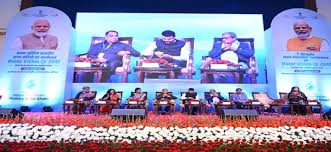06JAN, Delhi : Mathematics Session on Day 2 of the 1st All India Annual States’ Ministers Conference on “Water Vision@2047” on “Water Governance” aimed at breaking the silos in the water sector by bringing various states together facilitated by the center. The water resource projects are planned, funded, executed and maintained by the State Governments themselves as per their own resources and priorities.The role of the Government of India is limited to be catalytic, providing technical support and in some cases partial financial assistance in terms of the existing schemes being implemented by the Ministry of Jal Shakti. Since the water sector has inter-sectoral issues, effective inter-sectoral convergence is imperative for addressing the issues of water security. Dy. CM Shri Fadnavis said Maharashtra was the first state to create the water regulatory authority, while we will have 100% effluent treatment by local self governments in next 5 yearsMs. Archana Verma, Mission Director, National Water Mission said water is a politically sensitive subject and we need political will to succeed in this missionShri Sriram Vedire, Advisor to Minister of Jal Shakt highlighted the key features of Water and Allied Resources Information and Management (WARMIS)Ms. Anu Garg said Water user associations are very strong in Odisha under the name Pani PanchayatsMs. Mamta Verma, Joint Secretary, Ministry of Panchayati Raj, focused on Panchayat plan formulation through 9 localized SDGsThrough such conferences there will be convergence which will bring in synergies between different government programmes /schemes in terms of planning, process and implementation The convergence will bring in synergies between different government programmes /schemes in terms of planning, process and implementation. There is a need to focus on the 4 Es of Water Governance i.e., Ecology, Equity, Efficiency and Economics.Ms. Archana Verma, Mission Director, National Water Mission, Water Resources, RD &GR, Ministry of Jal Shakti emphasized that water governance is at the heart of water management. “Water is a politically sensitive subject and we need political will to succeed in this mission. There are multiple and vertical stakeholders in water management who need to coordinate,” she added. She further asserted that water meters, water pricing, water audit, water footprint and blue labeling can only ensure economic value of water. She concluded with 5R’s of water efficiency: Reduce, Recycle, Reuse, Recharge and Respect.Shri Devendra Fadnavis, Dy Chief Minister & Minister of Water Resources, Govt. of Maharashtra informed about the various policy reforms undertaken in Maharashtra including State Water Policy 2003 (amended in 2019), Maharashtra Management of Irrigation Systems by Farmers, Maharashtra Water Resources Regulatory Authority Act 2005, Wastewater Treatment Recycling and Reuse Policy 2017, as well as creation of Irrigation Development Corporations, State Water Council, State Water Board, Office of the Chief Water Auditor, Water and Land Management Institute and an Integrated State Water Plan.Shri Fadnavis said, “Maharashtra was the first state to create the water regulatory authority, while we will have 100% effluent treatment by local self governments in next 5 years,”. Jalyukt Shivar Abhiyan 1.0 was carried out in 20,000 drought prone villages, he added.Shri Sriram Vedire, Advisor to Minister of Jal Shakti stated that water data and information exist in silos and there are challenges in integration. He elucidated that the National Water Informatics Center was the custodian of all water related information, while Dam Health and rehabilitation application (DHARMA) is an asset management tool. He also highlighted the key features of Water and Allied Resources Information and Management (WARMIS)Unified data repository for water and allied resources dataUnified cloud hosting for all MoJS projectsState of the art Command and Control CenterGeo Spatial Analytics LabIntelligent Insight into data using various hydrological modelsSmart Dynamic DashboardsAutomated Early Warning ModulesDr Manas Ranjan Bhunia, Minister for Irrigation and Waterways and the Minister for Small & Micro Industries and Textile, Government of West Bengal informed how farmers have become custodians of irrigation infrastructure in the Sundarbans delta ensuring people participation in an institutionalized structure.Shri P Anabalan, Secretary, Water Resources, Government of Chhattisgatrh informed that the Chhattisgarh Water Resources Policy 2022 has been notified while the formation of the Chhattisgarh Ground Water Regulatory Authority is in process.Ms. Anu Garg, Principal Secretary, Water Resources, Government of Odisha outlined her vision of a water secure Odisha by 2047. She said, “Water user associations are very strong in Odisha under the name Pani Panchayats.” She also added how MMI projects have been completed in drought hit areas like Kalahandi, Kendrapara among others. Ms. Mamta Verma, Joint Secretary, Ministry of Panchayati Raj, GoI focused on Panchayat plan formulation through 9 localized SDGs. She added that information related to sanitation and drinking water are made available in e-Gram Swaraj for preparation of Panchayat Plans.The deliberation of the theme concluded with presentation of monument by Dy CM of Maharashtra Shri Devendra Fadnavis to all the participants who deliberated upon the theme.
ABOUT US
Sach News® - raising the voice of people of Jammu Kashmir since 1940. We are Publishing House of Daily Sach (Urdu Daily). Sach News, is one of the Oldest News Group of India having its office in Jammu Kashmir, Delhi. Reach us for Latest news on politics, sports, crime, education, real estate, business entertainment and much more. We provide you with the latest breaking news and videos straight from the ground zero.
Contact us: [email protected]
© Sach News Network 2011-2024 | Maintained by Sach Info Tech


